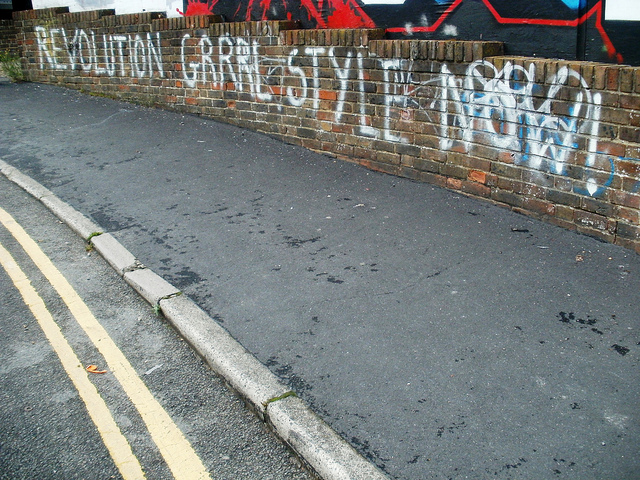
By Leah Caroll
Being a teenage girl is a losing social arbitrage of the soul. Wait—let me think of a better metaphor. A teenage girl is society’s punching bag. Still not quite right. A teenage girl is a vessel to be filled, a swath of land to be parceled out, a crumbling building to be demolished, a stray puppy about to be put down. An engineless airplane hurtling towards the ground. Really there is this: Being a teenage girl is a nightmare.
In The Punk Singer, director Sini Anderson shows how that nightmare fueled a feminist movement. In 1991, Kathleen Hanna told a writer chronicling the D.C. punk scene, “I’m really interested in a punk rock movement—an angry girl movement.” This autobiographical documentary chronicles the birth of that “angry girl movement”: a revolution of feminist ideals, DIY ethics, and punk-rock swagger that would become known as Riot Grrrl. At its center is Kathleen Hanna, who, with her bands Bikini Kill, Le Tigre, and The Julie Ruin, harnessed the collective rage of thousands of teenage girls into a coherent and propulsive force against sexual violence and pervasive misogyny.
“Find the biggest bitch in town and start a band with her,” she demanded.
As the singer in Bikini Kill, Hanna utilized her stage presence for social commentary. She had rules for the audience: girls to the front of the stage, respect for the performers. With her black ponytail swinging she writhed and bopped across the stage demanding nothing short of Revolution Girl Style Now. Performing in her bra, the word SLUT scrawled on her stomach, she challenged the traditional notions of what it meant to be a girl in a band. She could be titillating and dead serious at the same time. This was no novelty act. In an early zine she threw down the gauntlet: “Find the biggest bitch in town and start a band with her” she demanded. Revolution is not a dinner party, and it does not recognize gender stereotypes.
The media backlash was fast and quick. Publications like Newsweek oversimplifed the message and marginalized the performers, mistaking their earnestness for antics. In 1993, Chuck Eddy, writing for Rolling Stone, dismissed them with the written equivalent of a pat on the ass, saying “Any decent parent would be proud of a daughter who staked her claim as a ‘riot grrrl’ these days. The grrrls’ soundtrack of choice is Bikini Kill, an Olympia, Washington quartet featuring singer Kathleen Hanna, a twenty-three-year-old former stripper credited with inciting the whole riot-grrrl shebang.”
From her marriage to Beastie Boy Adam Horovitz to her struggles with late-stage Lyme Disease we see, maybe for the first time, the vulnerability of an icon who, to many, appeared invulnerable.
But for her fans, Hanna remained a musical and cultural force. In 1998 she founded the dance-punk group Le Tigre, punctuating her sociopolitical lyrics with lo fi beats and samples. As she struggled with a debilitating mystery illness that would eventually be diagnosed as Lymes, Hanna withdrew from the spotlight. Faced with a very real understanding of her own mortality she donated 20 years’ worth of zines, correspondence, and artwork to NYU’s Riot Grrrl collection, the university’s effort to “document the evolution of the Riot Grrrl movement, particularly in the years between 1989 and 1996.”
The Punk Singer documents Hanna’s life as a musician, artist, and feminist role model. Featuring interviews with the likes of Kim Gordon, Joan Jett, and current teenage girl, Tavi Gevinson of Rookie Mag, the film is surprisingly intimate. From her marriage to Beastie Boy Adam Horovitz to her struggles with late-stage Lyme Disease we see, maybe for the first time, the vulnerability of an icon who, to many, appeared invulnerable. The result adds a personal resonance to the ideas and values of the Riot Grrrl movement and is an acknowledgment that all of us have a teenage girl somewhere down deep in our souls, ready to be set free. It’s reassuring to see that the biggest bitch in town is also human; she’s grown up a bit and so have we. And that’s ok.
The Punk Singer is playing now in limited release.
Leah Carroll is a writer living in Brooklyn.

